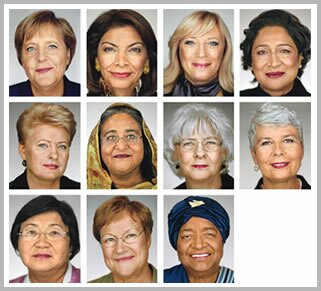 In today’s world where women make up nearly half of the workforce and more women than men are graduating from college, it would be easy to think that women have the same opportunities to succeed in any career as men do. Unfortunately, it’s just not true. A new article on the Newsweek Education website entitled “Year of the Woman? Eight Jobs That Are Still Sexist” highlights eight different careers in which women are still struggling to make their mark and break through that infamous glass ceiling.
In today’s world where women make up nearly half of the workforce and more women than men are graduating from college, it would be easy to think that women have the same opportunities to succeed in any career as men do. Unfortunately, it’s just not true. A new article on the Newsweek Education website entitled “Year of the Woman? Eight Jobs That Are Still Sexist” highlights eight different careers in which women are still struggling to make their mark and break through that infamous glass ceiling.
Here are the 8 job fields featured in the article:
- Journalism: Despite the fact that more women go to journalism school than men, they are vastly underrepresented. The Global Media Monitoring Project found that only 24% of people interviewed, heard, seen, or read about in the news (TV, radio, and print) are women.
- Law: Women are 1/2 of all law-school graduates, but less than 1/4 of law-firm partners, and on average, female attorneys are paid $66,000 less than male attorneys.
- Business: Only 3% of Fortune 500 CEOs are women.
- Science & Engineering: 31% of women with technical jobs switch into another career field – 63% of these women say they experienced workplace harassment, and 50% say they had to “act like a man” to succeed.
- Film & Entertainment: Only 16% of directors, executive producers, producers, writers, and cinematographers are women.
- Politics: The U.S. ranks 71st out of 189 countries when it comes to how many women are on national legislatures.
- Nursing: 9 out of 10 nurses are women, but they only earn 88 cents to every dollar a male nurse makes.
- Academia: Women make up just 26% of professors, 23% of university presidents, and 14% of presidents at the doctoral degree–granting institutions.
I have to be honest – not many of these career fields and statistics surprised me. In researching my book about women and careers, In Their Shoes, I found plenty of evidence to back up the reality that women are severely underrepresented in fields like science, business, film and entertainment, and journalism.
However, there is one occupation on the above list that did catch me off guard – nursing. I find it hard to believe that even in an industry where women make up the vast majority of professionals, men are still paid more. 12 cents for every dollar more. Which may not seem like a big deal, but turns out to be significant. A female nurse may be earning $50,000 a year while a male colleague with the exact same experience, training, and education would earn $56,000 based on this model. That’s $500 more per month, enough to impact someone’s quality of life.
When I read stories like this, I think back to the start of my own career, back when I had just graduated from Penn State, moved to New York City, and got an entry level job at an advertising agency for $16,000. I was the assistant to two media directors, and barely made enough money to cover my Diet Coke addiction, let alone pay for my share of the rent in my closet-like apartment and the Ramen noodles that made up the bulk of my diet. But it was the only way to break in – the way I saw it, I had to pay my dues, suck it up, and deal.
Though this was a while ago, I still remember the moment I realized that something fishy was going on at the agency. As I looked around, I noticed a disturbing trend: all of the female recent college grads like myself were in assistant roles, earning a pittance while we fetched coffee, made lunch reservations, typed up memos, and ran errands. Yet the male recent college grads were doing something completely different. They were assistant media planners – one level above where we women were. They were actually getting to go to lunches, participate in meetings, be a part of the action, not to mention bringing in about $8,000 more a year.
When I asked around to find out what was going on, the best we could up with was that we women had done better on the typing tests we had to take through the employment agency that originally placed us than our male counterparts. We were fast, accurate, efficient and eager to please. The perfect qualities for a young assistant, right? Right. But isn’t there something wrong with the picture when being good at something actually holds you back? Of course, I never said anything about this discrepancy to any higher ups at the company. I figured that if I did good work I would get noticed and promoted and paid what I was worth. I was afraid to rock the boat. Afraid to ask for what I wanted. Afraid to come off as being pushy. Instead, I quit after 9 months.
That first job was many (many!) years ago, but I’m sorry to say that it marked the beginning in a line of jobs where I took a similar wait and see approach. I didn’t know how to advocate for myself, let alone negotiate my salary. As I moved up in my career, this last piece became a bigger and bigger factor, as the difference between what I was earning versus what my male counterparts were was widening. Why? Because as I moved from job to job and company to company, my previous salary was always a factor in the new offer. Since I was on the low end of the pay scale, my new employer would offer me only a little more, figuring they were getting a great deal – high quality work for a low cost. And they were right. It was a good deal. For them. By the time I moved to LA as a development executive for a TV channel, my salary was way below the average for my position, especially compared with the men I knew doing my job for other networks, but I was stuck. They’d gotten me cheap because I didn’t know to ask for more. Ultimately, I left that position after a few years to strike out on my own as a writer. And boy, if anything has taught me to ask for what I want, it’s been being my own boss.
I know that today there are thousands upon thousands of recent young women college grads looking to break in and get started with their career, just like I was so many years ago. And in this climate, it might be tempting to take what you can get and say yes to any offer. If this is you, I urge you to respect yourself enough to ask for what you want. Advocate for yourself and negotiate. Because I just about guarantee you – young men in your position being offered jobs are negotiating. And they’re not just asking for what they want – they’re expecting to get it. According to Linda Babcock and Sara Laschever, authors of Women Don’t Ask, men initiate negotiations 4 times as often as women do. When women do negotiate, they don’t think they can get much, so they ask for and get less – 30% less than men!
Sigh. If only I’d read that statistic back in 1991. But it’s not too late for you! Ask for what you want today and maybe twenty years from now, Newsweek will be writing the story that says women have finally achieved true equality in the workforce!


 Well, it’s Thanksgiving Day, and I feel the need to share that for the past few days, I haven’t been feeling very thankful. Truth be told, I’ve been feeling cranky and stressed out. You see, we had a snowstorm here in Seattle on Monday morning, and it kind of interfered with my finely laid plans about what my week would look like. My 6-year-old son’s school closed by noon Monday, and was closed Tuesday and Wednesday. So my few days of work here at home, sitting nice and cozy in my office flanked by Baxter the dog and Alex the cat vanished into thin air. Instead, it’s been a week of sub-freezing temperatures, roads too icy to drive on, and cabin fever, not to mention the fact that until this morning, I hadn’t been able to get out for a run all week. And if you know me, you know that’s not a good thing, since running, for the most part, is what keeps me from turning into what my son calls “mom dementor.”
Well, it’s Thanksgiving Day, and I feel the need to share that for the past few days, I haven’t been feeling very thankful. Truth be told, I’ve been feeling cranky and stressed out. You see, we had a snowstorm here in Seattle on Monday morning, and it kind of interfered with my finely laid plans about what my week would look like. My 6-year-old son’s school closed by noon Monday, and was closed Tuesday and Wednesday. So my few days of work here at home, sitting nice and cozy in my office flanked by Baxter the dog and Alex the cat vanished into thin air. Instead, it’s been a week of sub-freezing temperatures, roads too icy to drive on, and cabin fever, not to mention the fact that until this morning, I hadn’t been able to get out for a run all week. And if you know me, you know that’s not a good thing, since running, for the most part, is what keeps me from turning into what my son calls “mom dementor.” This month,
This month,  In today’s world where women make up nearly half of the workforce and more women than men are graduating from college, it would be easy to think that women have the same opportunities to succeed in any career as men do. Unfortunately, it’s just not true. A new article on the Newsweek Education website entitled
In today’s world where women make up nearly half of the workforce and more women than men are graduating from college, it would be easy to think that women have the same opportunities to succeed in any career as men do. Unfortunately, it’s just not true. A new article on the Newsweek Education website entitled  I just heard about two potential writing opportunities for teens I wanted to share with you!
I just heard about two potential writing opportunities for teens I wanted to share with you! Do you have a hero in your life? Maybe it’s someone in your family, or a teacher, or a tutor. Maybe it’s a friend or a mentor. If so, Subway (yes, the sandwich company) wants to hear from you. Subway has just partnered with the production company Electus to launch – an 8-week program encouraging high school students to nominate inspirational heroes from their lives.
Do you have a hero in your life? Maybe it’s someone in your family, or a teacher, or a tutor. Maybe it’s a friend or a mentor. If so, Subway (yes, the sandwich company) wants to hear from you. Subway has just partnered with the production company Electus to launch – an 8-week program encouraging high school students to nominate inspirational heroes from their lives.
